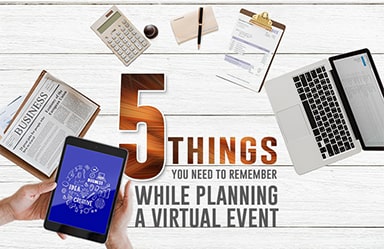


While the pandemic has made everyone try their hands at virtual events, only those that are well-planned have managed to make a mark. If you want to maximise the number of attendees, create a stickiness factor, make contacts and generate leads in your next big online event, here are five key points to remember for a successful virtual event.
The chalkboard stage of any event is the most vital. Ahead of the planning, make sure you know who the target audience is. Knowing the target audience includes having a clear understanding of their age, background, awareness around the brand, availability around the time of the event and most importantly, knowing if they are equipped to attend it. After deciding on the target audience,
Sometimes when you innovate, you make mistakes. It is best to admit them quickly, and get on with improving your other innovations.
you must sit down to analyse your goals. For instance, if you are targeting decision-makers, then your event should promote your brand in a way that it generates interest among buyers and creates inroads into further communication. On the other hand, if your event is an award function or an annual day, it should be designed in a way that your attendees enjoy the event, feel inspired by it and stay engaged. With the right understanding of one’s target audience and with the right goal in place, you can give a better brief to your event planner for them to create a property that matches your checklist.
While ‘Content is King’ might sound like a cliché, it still applies to every facet of marketing. Whether you are looking at selling a product through your virtual event, or trying to gift an experience to your attendees, content should be designed in a way that it inspires the audience and keeps them engaged. Cracking the right content code is winning half the battle when it comes to creating a virtual event.
While you might have a good budget and a plan in place, you need an equally brilliant partner to put it through and give your attendees a holistic experience. Choose a vendor with experience (preferably a company that also has experience of physical events) and choose someone that assures to provide end-to-end support. While virtual events require extreme technical support, one must always look for a partner that helps them with promoting the event, sending out feelers and understanding the returns based on the budget that has been earmarked.
Always remember that interactivity and engagement is key to a good marketing strategy. Engagement comes from reaching out to a prospective customer with solutions that they are looking for and this is where customization comes in. Your virtual event should be customized not just as per your brand image, but also audience requirements. Look for maximum customization for better targeting and better results, include touch points such as testimonial booths, 3D environments, multiple chat options and feedback forms to maximize interactivity and engagement throughout the virtual event.
Your event should never restrict itself to the couple of hours that you are hosting it for. Know that your event starts way before the actual event day and ends way after it is over. One of the most vital things to remember while planning a virtual event is to keep the conversation going and growing. From using push notifications to newsletters to email reminders and social media, the event should be a success from the day it is announced. During the event, you can create a buzz around it with simple value adds such as hashtag challenges, photo booths, social media posts while also incentivizing these to create the maximum impact. Even after the event is over, keep posting blogs or simple takeaways on your social media handles and keep encouraging your participants to do the same. This way, the event has a longer shelf life and a huge recall value.